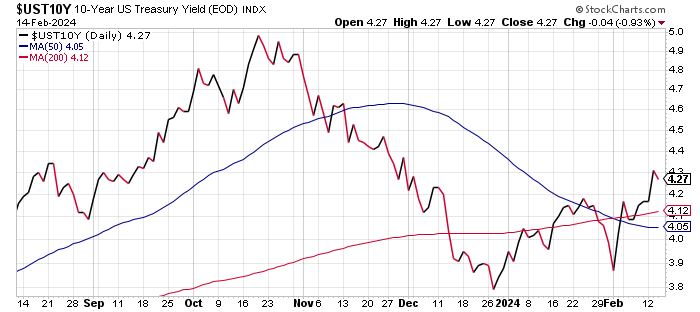* US stock market rally still long way from irrational exuberance: SocGen analysts
* Immigration wave delivers economic windfall for US–at a price
* Nvidia passes Alphabet in market cap to become 3rd most valuable US firm
* Japan economy unexpectedly fell in fourth quarter
* UK economy contracted in fourth quarter
* Bitcoin market cap regains $1 trillion market cap after latest rally
* US mortgage rates are rising again, taking a toll on housing demand
* US 10-year Treasury yield dips for first time in over a week:
10-Year US Treasury Yield ‘Fair Value’ Estimate: 14 February 2024
The US 10-year Treasury yield spiked yesterday following the release of hotter-than-expected consumer inflation data in January. The news also convinced the market that the Federal Reserve would push the first interest rate cut for this cycle later into the year. But a fresh run of “fair value” modeling continues to suggest that the 10-year yield is elevated relative to macro conditions.
Macro Briefing: 14 February 2024
* Fed expected to delay rate cuts after hotter-than-expected inflation data
* US 10yr Treasury yields rises sharply to 4.32%–highest since November
* Can a resilient US economy withstand higher interest rates?
* US patent office rules that AI systems cannot be named inventors
* Bitcoin rises above $50,000, showing resilience after hot inflation report
* US consumer inflation is firmer than expected in January:
High Yield Bonds In Emerging Markets: 2024’s Upside Outliers
Much of the global bond market is struggling this year, with a conspicuous exception: below-investment-grade bonds issued by companies in emerging markets. Based on year-to-date results through Monday’s close (Feb. 12), this slice of global fixed income is outperforming and delivering a rare bit of strength in an otherwise lackluster field, based on a set of ETF proxies.
Macro Briefing: 13 February 2024
* Rate cuts probably won’t start until the summer, says Atlanta Fed president
* January consumer inflation expectations “mostly stable,” reports NY Fed survey
* Saudi Arabia’s Aramco suspends expansion plans due to green transition
* Natural gas prices fall to 3-1/2 year low on
* Japan’s stock market continues to test multi-decade highs
* US small business optimism remains below 50-year average in January:
Mixed Start For US Bonds So Far In 2024
Modest gains in some corners of fixed income contrast with sharp losses elsewhere for year-to-date results with the broadly defined US bond market, based on a set of ETFs through Friday’s close (Feb. 9).
Macro Briefing: 12 February 2024
* US recession risk may be fading, but political risk is rising, warn economists
* Inflation, earnings and retail sales are in focus for this week’s data updates
* US Q1 GDP nowcasts via Fed banks (NY and Atlanta) indicate 3%-plus growth
* Several valuation metrics suggest US stocks are becoming relatively pricey
* Estimates of neutral rate imply Fed policy is highly restrictive
* Empty office space is increasingly catching Wall Street’s attention
* Policy-sensitive US 2-year Treasury yield rises to two-month high:

Book Bits: 10 February 2024
 ● A World Safe for Commerce: American Foreign Policy from the Revolution to the Rise of China
● A World Safe for Commerce: American Foreign Policy from the Revolution to the Rise of China
Dale C. Copeland
Review via The Wall Street Journal
There is therefore a historical irony that comes in Mr. Copeland’s important final chapter, for the story here, as he puts it, is of “the great geopolitical struggle” of the 21st century “between a seemingly declining United States wanting to maintain a semblance of preeminence and a rising China seeking to establish itself as a dominant, if not the dominant, state in its region and perhaps the world.” Here, for the first time in more than a century, there exists another nation with a GDP almost as large as America’s, a nation that sells far more to the U.S. than it purchases, a nation that seems impervious to American pressure. All this suggests to Mr. Copeland that there is a trade war in which America seems to be losing, not winning. “A World Safe for Commerce” thus ends with the author’s recommendations for robust policies to preserve America’s world order, which may be another reason for paying attention to this work.
Research Review | 9 February 2024 | Cross Market Analytics
A Changing Stock-Bond Correlation: Explaining Short-term Fluctuations
Garth Flannery (BlueCove) and Daniel Bergstresser (Brandeis Intl Business School)
December 2023
This paper builds on a framework that uses macroeconomic drivers to explain long-term variation in the correlation between stocks and bonds. The existing work focuses on the relative volatility of growth and inflation and the correlation between them and explains about 70 percent of the variation in rolling 10-year stock-bond correlation. We focus on forecasting short-term variation in stock-bond correlation with measures that capture the extent to which individual forecasters’ predictions about those markets have the same sign or opposing signs. Our framework enhances stock-bond correlation forecasting at tactical horizons, which we define here as the next three months.
Macro Briefing: 9 February 2024
* OpenAI’s Sam Altman seeks to raise trillions of dollars to reshape chip industry
* China’s real estate crisis is starting to spill across borders
* Economists debate outlook for China’s economy
* Emerging markets have been surprisingly resilient despite rising interest rates
* Nuclear fusion project achieves world record in generating energy
* US jobless claims remain near lowest level in decades:



